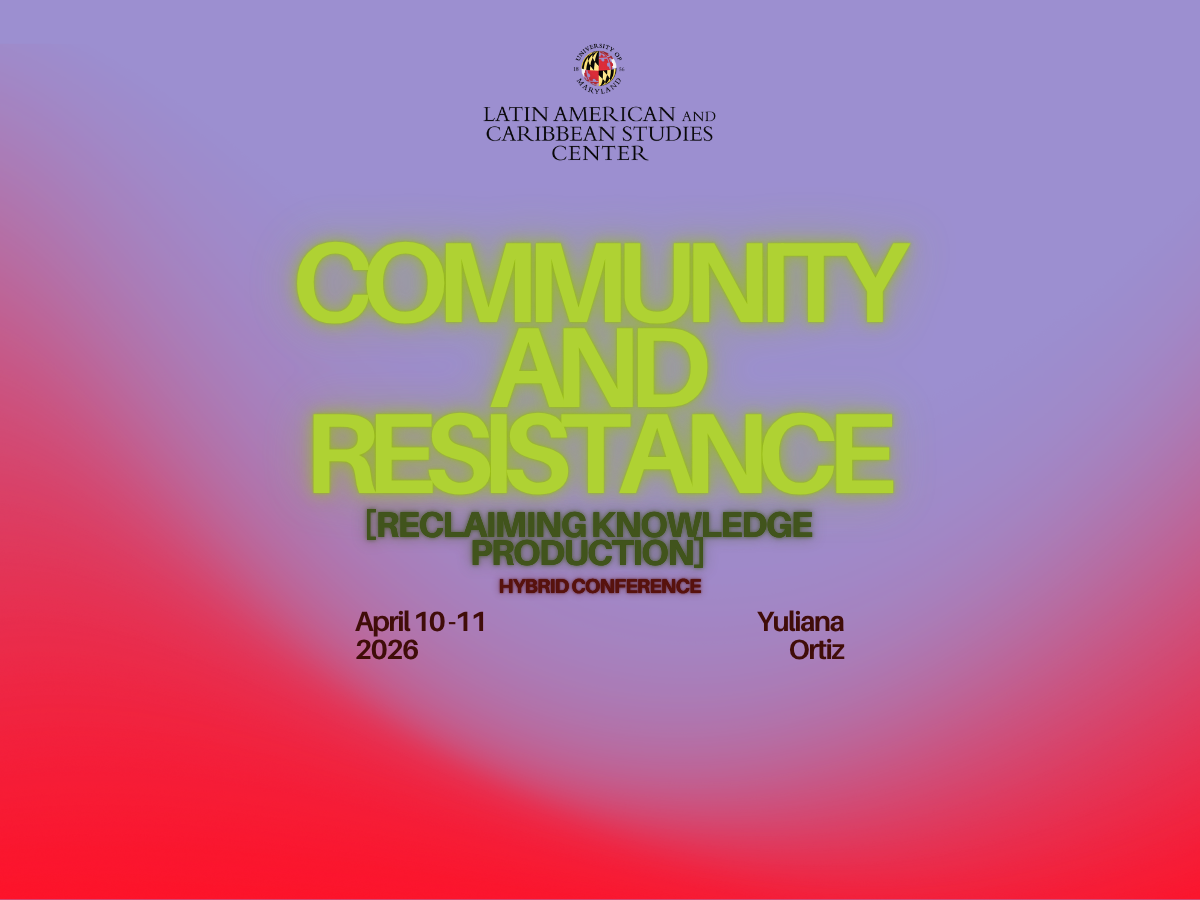Annual Grad Student Conference
Learn about the Annual LACS Student Conference
Every year, the students of LACS host a conference featuring panels of graduate and undergraduate students as well as important keynote speakers from the various communities that make up Latin American and Caribbean Studies. Click on the images below to take you to the main conference pages.
Current Conference
Community and Resistance: Reclaiming Knowledge Production
16th Annual Student Conference to be held on campus on April 10 and 11, 2026.
Call for Proposals
Community and Resistance: Reclaiming Knowledge Production
A Conference at the University of Maryland, College Park
April 10-11, Hybrid
Keynote Speaker: Yuliana Ortiz
The graduate students of the Center for Latin American and Caribbean Studies (LACS) at the University of Maryland, College Park, invite proposals for our upcoming conference, “Community and Resistance: Reclaiming Knowledge Production.” Our conference seeks to create a horizontal and transdisciplinary space to learn about, consider, and practice ways of producing knowledge that counter and offer alternatives to the kinds of knowledge that depend upon and reproduce that which Gayatri Chakravorty Spivak describes as “epistemic violence.” In contexts of epistemic violence, dominant actors and structures often invalidate and seek to silence or discredit ways of knowing that emerge from marginalized agents and communities. One example of that is the destruction of Indigenous knowledge by colonial education systems and the imposition of dominant narratives that erase the experiences of marginalized people, leading to their reduced credibility as knowers within the academy. At the same time the acts of resistance keep emerging to deal with the impositions of power and violence. Such is the case of what Cristina Rivera Garza proposes in The Restless Dead: Necrowriting and Disappropriation, where she states that communal writing is a practice of resistance to necropolitics and contexts where violence has become commonplace. Thus, necrowriting is understood as processes of “[…] eminently dialogical writing, that is; that in which the empire of authorship, as a producer of meaning, has radically shifted from the uniqueness of the author to the function of the reader, who, instead of appropriating the material of the world that is the other, disappropriates it.”
We are also inspired by Edouard Glissant, who invites us to think about how interdependence, opacity, and cross-cultural influences can be forces of knowledge and resistance. In his book Poetics of Relation (1990), for example, Glissant describes a “latent, open poetics, with a multilingual intention, in tune with all that is possible.” This poetics conceives of the conditions created by coloniality as providing spaces for encounter and openness to multiple cultures and communities. Thus we do not seek to define community as a shared essence or a closed identity, but rather to think about its capacity to relate to other communities, bodies, and territories.
We invite academics, artists, and scientific researchers, especially graduate students and early career scholars, to present papers that address the topics of how knowledge is or historically has been generated and transmitted in Latin America and the Caribbean.
The following questions may help guide proposals:
How is knowledge relational? How is it shaped by communities, orality, and corporeality
What forms of knowledge are produced at the margins, and how do they challenge epistemic hierarchies?
What poetic or scientific methodologies can be imagined from communality and relation?
How is knowledge produced from territorial resistance, memory, and collective care?
Possible Topics Include:
- Embodied knowledge: Art, body, and memory
- Situated science, community feminisms, and collaborative practices
- Poetics of opacity, miscegenation, and relationality
- Communal experiences of knowledge creation and dissemination
- Decolonial education and pedagogies of care
- History and memory
- Epistemic injustice and epistemicide
Cultural heritage preservation
Please submit proposals here consisting of a title and an abstract of no more than 250 words by November 28.
Formats accepted: Panels and papers.
Presentations can be in Spanish, English, French, or Portuguese.
Past Conferences
Oye como Va: Sound, Voices and Movements in the Americas
May 4th and 5th, 2023 | St. Mary's Hall Multipurpose Room
Disruption: Destructive and Generative Ruptures in Latin America and the Caribbean
April 29 and 30, 2021 | Virtual
Fuego y Leña // Slow Burn: Food, Justice, and Sovereignty in the Americas
September 24-25, 2020 | Virtual
Huracan, Tormenta, Storm: Winds of Change
May 2-3, 2019 | H.J. Patterson Hall 2124
QUEER/CUIR AMÉRICAS: Rebels, Counternarratives, Solidarities
May 3-4, 2018 | H.J. Patterson Hall 2124
Sanctuary, Refuge, Oasis
May 4-5, 2017 | McKeldin Library, Special Events Room 6137
Hybridity: Examining Processes of Circulation, Collaboration, and Conflict
May 5-6, 2016 | McKeldin Library, Special Events Room 6137
Making Home: Central American Transnational Communities
May 1, 2015 | McKeldin Library, Special Events Room 6137


